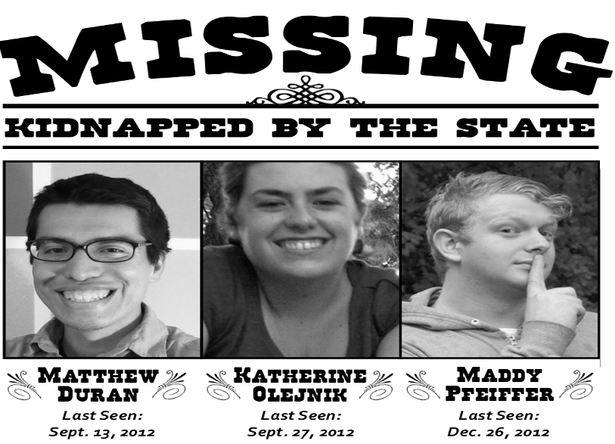
At 4 p.m., Katherine “Kteeo” Olejnik and Matthew Duran tasted freedom for the first time in more than 5 months. The two have been imprisoned, without being convicted or charged of any crimes, for their failure to cooperate with a grand jury that has been convened in the Pacific Northwest to investigate anarchists allegedly involved in property destruction on May Day of 2012. Another grand jury resister, Maddy Pfieffer, remains in custody.
In a statement authorizing their release from federal custody, Judge Richard A. Jones writes:
Both Ms. Olejnik and Mr. Duran have provided extensive declarations explaining that although they wish to end their confinement, they will never end their confinement by testifying. The court finds their declarations persuasive. They have been submitted to five months of confinement. For a substantial portion of that confinement, they have been held in the special housing unit of the Federal Detention Center at SeaTac, during which they have had no other contact with detainees, very little contact even with prison staff, and exceedingly limited ability to communicate with the outside world…
In levying prison time for civil contempt, or failure to testify before a grand jury, the court attempts to coerce the witnesses to answer questions from the prosecutor, which they have previously refused by invoking their Fifth Amendment right against self-incrimination. Even with these rights, the witnesses can still be imprisoned for their refusal to talk. However, when it becomes apparent that no amount of jail time — the maximum for civil contempt is 18 months — will coerce the witnesses to talk, the court is obligated to release them, because the jail time becomes “punitive” and not coercive.
For the past two months, Olejnik and Duran have been in solitary confinement, which consists of 23 hours a day confined to their cell, an hour a day moved to a larger cell (but still alone), 15 minutes per month of phone use (a reduction from five hours for inmates in general custody), and very limited access to reading and writing material. Even contact with prison guards is minimal, completing their total isolation.
Acknowledging their harsh treatment, Judge Jones writes:
Their physical health has deteriorated sharply and their mental health has also suffered from the effects of solitary confinement. Their confinement has cost them; they have suffered the loss of jobs, income, and important personal relationships. They face the possibility of criminal convictions for contempt…
Even with their release, that is, Olejnik and Duran still face the possibility of criminal prosecution for their refusal to testify. Although a rarity, animal-rights activist Jordan Halliday was convicted of criminal contempt, and became just the third person in U.S. history to go to prison again after already serving time for civil contempt of court.
But in a strongly worded statement, Judge Jones upheld the assertions that Olejnik and Duran have made and their outright refusal to cooperate:
The court has observed both Ms. Olejnik and Mr. Duran in their prior appearances before the court. Whatever the merits of their choices not to testify, their demeanor has never given the court reason to doubt their sincerity or the strength of their convictions.
This marks a major victory for activists resisting intimidation by grand juries. Olejnik and Duran’s refusal to cooperate, though it has cost them five months in prison, is reminder that through solidarity and silence, activists can protect their communities from the repression waged by the state.

Another very welcome piece of news on the repression beat: OWS activist Michael Premo was found not guilty of assaulting cops, thanks to the footage of Democracy Now! cameraman Jon Gerberg. Nick Pinto has a great report at The Village Voice: “Jury Finds Occupy Wall Street Protester Innocent After Video Contradicts Police Testimony.”
Good point, Nathan. And I think (correct me if I’m wrong), that Premo’s was the first jury trial of OWS. As Elizabeth Fink, a social justice lawyer once said, “There is no justice in the American justice system, but you can sometimes find it in a jury.”
Their courage is laudatory. Bravo! Is that what it takes to fight for justice which is not guaranteed? Yes.
I agree, Carole. Such courage. Thank you Tom for celebrating this victory in this article.
There is certainly noticeably a bundle to know about this. I assume you produced particular nice points in functions also.
christian louboutin sale 2012